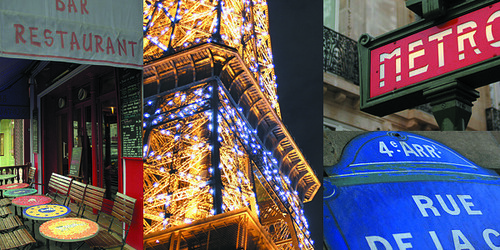Formules de politesse

I spend a lot of time thinking about social codes and levels of politeness over here in France. The whole tu/vous thing, which I still stumble over sometimes and doesn't make a whole lot of sense to me. Having to address people when you speak to them, not just say "Bonjour" but "Bonjour Monsieur" to the baker. Every morning I see our neighbor downstairs while I'm taking the dog out for her morning business, every morning I smile and say "Bonjour", and every morning he replies with "Bonjour Madame" and every time he does that I curse under my breath and say to myself that I have to remember to address him as Monsieur tomorrow. Which I never do. Such is the drivel that runs through my almost-bilingual head several times a day. Even after years and years of studying French, I am still sometimes taken aback by the level of politeness that is so inherent in daily french life and the language.
The other day, on line 10 coming back from brunch at Breakfast in America, an older monsieur was standing between the two rows of seats, and I was trying to pass by to get to where Eddie had found some seats. I let slip a quiet, sing-songy "Pardon" to the monsieur. To which he looked up at me, not having realized I was standing there, moved into the seat and said "Eh bien, je vous en prie, Madame". He might have even bowed a bit. I passed by without another sound, sat down and contemplated.
Now normally, when someone says "Pardon" to me, when they are trying to pass by, I don't say anything, don't even look up, perhaps grunt in recognition and then move out of the way. In comparison to this man's flourish, my initial demand and resulting response truly felt impolite. Seeing as it was an older gentleman, I should have said "Pardon, Monsieur", followed by "Je vous remercie, Monsieur". That kind of civility, though, does not flow easily off my gum-smacking tongue. To my laid-back California ear, such niceties even smack a bit of condescension, even if I know it is not the case here. Such an elaborate language in California would, in my opinion, be used to as a form of subtle sarcasm. But it isn't the case here at all (or, well, at least most of the time, there are always exceptions). French society, and inherently the language, is built around a democratic notion of defining space and relationships, respecting the other person's anonymity and level. The French are quite proud of their language and the more elaborate, flowery and polite the language you use, the better response you will always get.
Case in point: as I was writing up this entry, I received an email from the university office regarding my French test results from last year. On Friday I had painstakingly drafted an elegant and polite email, using long-winded sentences punctuated by "Madame, Monsieur," at every other line, in order to ask if it would be possible to pick up another copy of my test results even though they were from a year ago. I had expected an answer that would indicate that since they were from last year, I would need to come in to fill out a form and pay a supplement to receive them. Instead, though, the lady sent my results as an email attachment, even wishing me a "good reception", thus saving me a calculated afternoon trip into the Latin Quarter.
Exagerrated politeness, it would seem, will take you far in this country.

0 Comments:
Post a Comment
<< Home